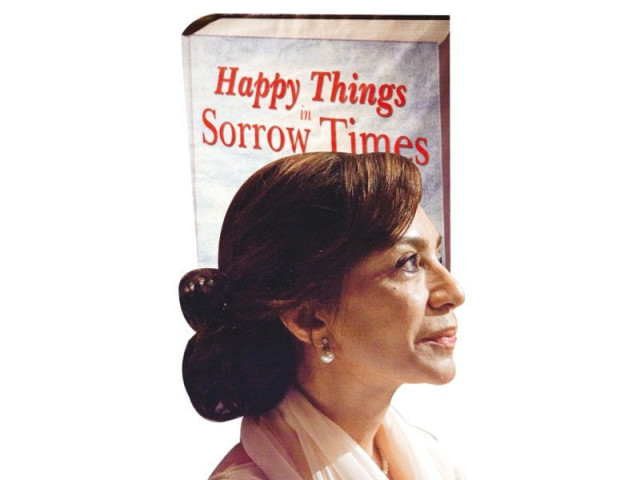Book launch: The plight of the war child
Tehmina Durrani-Sharif’s new book outlines the sting of growing up in a war zone.

"The last batch of war children became the Taliban and al Qaeda. All of us have a role to play in what we leave behind," Author Tehmina Durrani-Sharif. PHOTO: MYRA IQBAL / EXPRESS, DESIGN: AMNA IQBAL
The book, published by Ferozsons, is a work of fiction based in fact, detailing the journey of a young Afghan girl as she flees Afghanistan, only to return post-September ‘11 to assist her people to survive the demons of a 35-year war.
A veritable who’s who of the city assembled at the Pakistan National Council of the Arts, with ambassadors, politicians, business persons, social activists and socialites in attendance, most in their finest formal wear and a few in less fine casual gear.
As audience members seated themselves, some had already begun discussing the book. Some whispers were serious, others less so, such as a group of women skimming through the book and discussing how the Pashto word ‘tor’ (black) sounds exactly like the Urdu word ‘tor’ (to break).
Former Senator Enver Baig, Argentine Ambassador Rodolfo Saravia, Zafar Iqbal Jhagra, former Ambassador Maleeha Lodhi, General (retd) Hamid Gul, retired fast bowler Shoaib Akhtar, and musician Shehzad Roy were only a few of the many notables in attendance.
Senior journalist Rashid Rehman said the journey that Durrani-Sharif has undertaken is diverse and complex and is reflected in her books. Explaining the importance of seeing the story rather than just reading it, Rehman said, “As young children, we saw Vietnam and the pictures of violence. We may get used to bloodshed, through the barrage of images, but this book shows what the Afghan people went through for over a decade.”

He described the book as a multi-layered mix of fable, fantasy, and magical realism, while adding, “We are victims of what is happening in our borderlands and beyond,” in a reference to extremism that is biting at the hearts of both neighbouring countries.
A short video feature based on the book followed after the introductory speeches, after which Durrani-Sharif spoke to attentive members of the audience.
“I wanted to write something on this region, and I knew this was something I would continue to be interested in,” she said.
She mentioned that she penned some pieces at the onset of the Afghan War (1979) and what she wrote then had stayed in her mind. “This was my ‘first’ book, it came to mind before My Feudal Lord.”
Durrani-Sharif said the book is not a ‘literary effort’ per se. “I’m not competing with literary geniuses with this book. For me, the problem is bigger than the language. If it gets through, if you can feel [the plight of the war child], that’s what matters most to me.”
She said she has always aimed to raise her voice for “the oppressed, the silenced, and the shackled”, while lamenting that people are punished for the decisions made by their politicians.
“You cannot blame the people of America or Pakistan for the decisions of their politicians,” she said, before referring to the problematic peace talks in Doha, Qatar.
She lamented that a majority of Afghans have lived their entire lives in a state of war, yet nurturing and counselling the war child was never part of war policy.
“The last batch of war children became the Taliban and al Qaeda. All of us have a role to play in what we leave behind,” she added.
Durrani-Sharif talked about Harriet Stowe’s Uncle Tom’s Cabin and its role in creating awareness of slavery in the US. “I hope this book can impact citizens of the world, especially the children of the world.”
Former ambassador Maleeha Lodhi was impressed by Durrani-Sharif’s moving speech for children of war. “Although her book and speech were about three decades of the Afghan conflict, it could have been about any other country, including ours.”
Zohair Alam, a development professional, said the event was well-arranged and the speakers were good, but added that he was put off by the uncivilised lines when the book signing began.
Ambassador Saravia said the event was great, and well-run. “I loved the speeches. Normally, a series of speakers go on and on, but here, there were only three. They kept their speeches short and amusing, leaving one wanting to hear more.
Meanwhile, the author told The Express Tribune, “I want to pledge my life to the future of war children.
There was also an exhibition of Afghan-style miniatures, showing the plight of the Afghan woman, some clothing, and a model tent house which much of the country still calls home.
Published in The Express Tribune, June 30th, 2013.
Like Life & Style on Facebook, follow @ETLifeandStyle on Twitter for the latest in fashion, gossip and entertainment.



















COMMENTS
Comments are moderated and generally will be posted if they are on-topic and not abusive.
For more information, please see our Comments FAQ